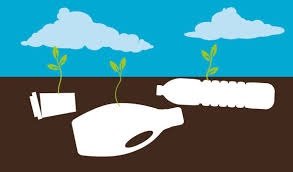MUMBAI/NEW DELHI (India CSR): As the world grapples with the twin crises of plastic pollution and climate change, India is eyeing a transformative shift: replacing petroleum-based plastics with sustainable, bio-based alternatives. Powered by biotechnology and policy momentum, bioplastics are emerging as both an environmental necessity and an economic opportunity for the world’s most populous nation. In September 2025, a Vizag based researcher patented bioplastic manufactured out of ghee residue. a biodegradable, non-toxic bioplastic suitable for dry food packaging. IIT Guwahati has made Indian Railways in the NorthEast convert to bioplastic bags for packaging linen.
“The economic opportunity is undeniable”, says US based biotechnology and sustainability expert Ravi Venkatachalam. “India generates over 3.4 million tonnes of plastic waste annually, much of which ends up choking waterways, landfills, and oceans. Despite regulatory interventions—most notably the 2022 ban on single-use plastics—viable substitutes remain scarce. Experts say bioplastics could fill this glaring gap, offering greener pathways to cut pollution while driving industrial growth. Organisations that have a winning product will make it big!”
Lets understand bioplastics better. They fall into two broad categories:
- Biodegradable variants such as PHAs and PLA, which break down naturally.
- Bio-based but non-biodegradable plastics like bio-PET and bio-PE, which can be recycled but not composted.
Their applications stretch across food packaging, textiles, agriculture, consumer goods, and even medical devices. Recent breakthroughs are unlocking novel ways of production: from microbes turning food waste into plastic, to algae-based bio-factories and low-energy enzyme-driven processes that make production more efficient and cost-competitive.
Pioneering Vizag researcher Dr Rasheeda Khanam, whose patent enables the manufacture of bioplastic from ghee residue says, “ We have tested the bioplastic for tensile strength and is also safe for food contact. Its usage is being tested to package foodgrains.”
Prof. Vimal Katiyar, who leads the IIT Guwahati research team, working with Indian Railways, also emphasises the environmental benefit of his innovation: “Replacing conventional plastic packaging with biodegradable alternatives will significantly reduce plastic waste and help protect our fragile ecosystems.”
The science suggests that unlike petroleum-based plastics, which are non-biodegradable and energy-intensive to produce, bioplastics can:
- Cut greenhouse gas emissions by up to 73%, depending on the material.
- Require up to 65% less energy to manufacture.
- Provide compostability or recyclability, depending on the type.
Despite the success stories, adoption in India remains nascent, with infrastructure and awareness still catching up. The global bioplastics market, worth an estimated ₹16.77 lakh crore in 2024, is projected to nearly triple to ₹45.01 lakh crore by 2030. Driven by consumer demand and policy shifts, India’s domestic market—though small—is expanding rapidly, particularly in FMCG and agriculture.
For India, the opportunity is more than just environmental. Scaling bioplastics could:
- Reduce reliance on imported petrochemicals.
- Generate green jobs in rural and semi-urban economies.
- Accelerate Make in India initiatives.
- Ensure compliance with Extended Producer Responsibility (EPR) mandates.
The path, however, is far from smooth. Bioplastics currently cost more to produce, and India lacks large-scale composting infrastructure. Massive investment is required—a single plant can cost upwards of Rs 2,850 crore—to make production viable at scale. Global parallels include NatureWorks’ USD 350 million facility in Thailand and Floreon’s USD 328 million fundraise in 2024. Therefore, public-private partnerships, subsidies, and bold policy incentives will be critical for India to transition from pilot projects to industrial-scale success.
Bioplastics represent more than a green alternative—they could be the cornerstone of India’s sustainable industrial future. As ecological stress reaches breaking point, India has both the biotech acumen and agricultural base to lead a bioplastics revolution, turning its plastic crisis into an opportunity for global leadership.
(India CSR)







